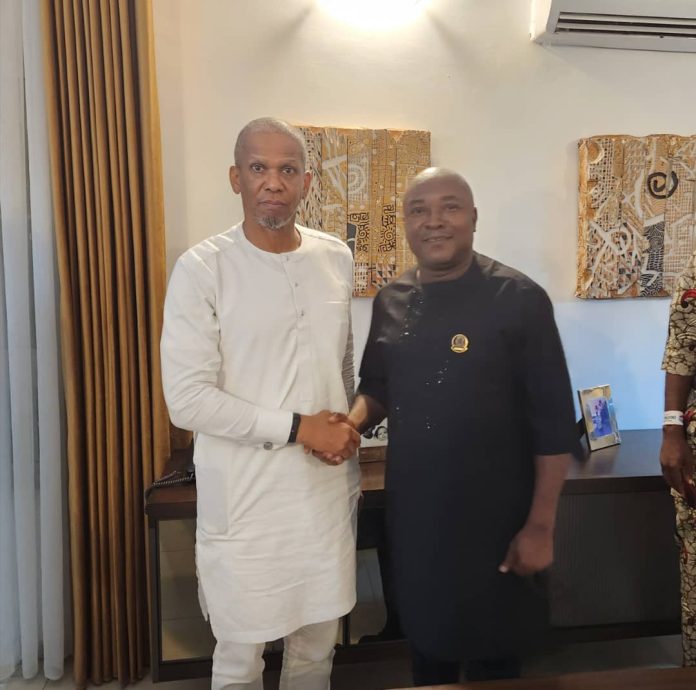By Nelson Egware
A quiet renaissance is unfolding in Delta Central, one marked by purposeful leadership, people-centric governance, and an unwavering commitment to progressive politics. At the heart of this transformation stands Senator Ede Dafinone: an accomplished accountant, economist, environmental advocate, philanthropist, and legislator. His election as Senator representing Delta Central has not merely rekindled hope within the Urhobo nation; it has fundamentally reshaped the contours of effective representation.
The son of the late Chief David Omueya Dafinone, a revered statesman and national figure, Senator Dafinone has inherited more than just a storied name, he has inherited a legacy steeped in integrity and service. Yet, rather than resting on this heritage, he has forged his own path, one defined by a clear vision: to build human capacity and elevate Urhobo interests in Nigeria’s broader national discourse.
Since assuming office in 2023, Dafinone has embraced governance with a quiet determination. Eschewing theatrics and political spectacle, he allows his work to speak volumes. Whether on the Senate floor or within the grassroots corridors of Delta Central, his commitment to transparency, development, and results-driven leadership remains unmistakable.
As Vice Chairman of the Senate Committee on Local Content and a member of key committees, including Finance, Public Accounts, and Ethics. Dafinone brings to bear a wealth of experience drawn from his distinguished career in the private sector. As a chartered accountant and corporate leader, he leverages these credentials to influence national policy in ways that ensure Delta Central is neither marginalized nor overlooked in matters of economic sustainability and inclusion.
Though not one for political fanfare, the resonance of his efforts reverberates throughout Delta Central. From advocating ecological interventions in flood-prone areas such as Sapele, Ughelli, and Udu, to championing legislative and budgetary instruments aimed at climate resilience, his environmental advocacy remains consistent and impactful.
Senator Dafinone’s commitment to human capital development long predates his current office. Through the Dafinone Foundation, he has empowered individuals through vocational training, business support, and educational sponsorships. As a Senator, this vision has scaled dramatically: training initiatives in renewable energy, fish farming, agribusiness, digital literacy, and tailoring now serve as vital economic lifelines. Constituents have gained access to federal job placements, seed capital, and empowerment tools, particularly targeting women, youths, and widows.
Addressing social media influencers from Delta State during the Progressive Digital Media Summit in Abuja, Dafinone recounted his transition from boardrooms to public service, emphasizing humility and strategic focus as hallmarks of his leadership. He encouraged constructive engagement with his office and pledged to support every sincere initiative aimed at advancing Urhobo progress.
His empowerment model is not transactional but transformational, anchored in measurable outcomes and long-term impact. For Dafinone, politics is not merely about occupying office, but about lifting people and shaping destinies.
He continuously urges capable Urhobo sons and daughters to aspire to leadership, convinced that increasing the region’s representation enhances its political and economic leverage. Among his forward-thinking initiatives is a blueprint for developing an agro-export hub via the Osubi Airport, an ambitious vision designed to position Delta Central as a trade and logistics powerhouse.
Across the eight local government areas of Delta Central, his constituency interventions are both widespread and strategic. He has facilitated the construction of ICT centers in schools across Udu, Okpe, Ughelli North, and Abraka; installed solar-powered streetlights in communities across Sapele, Ughelli South, and Uvwie; and delivered a 50-room hostel to FUPRE. Health centers have been equipped, transformers replaced in Jesse and Okpara, and science laboratories upgraded in Sapele. Additionally, rural transport facilities have been built to improve access and mobility.
Medical outreaches, water purification training, and agribusiness starter kits have touched hundreds of lives, initiatives executed without pomp, yet anchored in genuine service. These efforts reflect a model of representation grounded in tangible outcomes rather than empty rhetoric. Within just two years, his performance offers a compelling rebuttal to any narrative of legislative underperformance.
Perhaps most defining is his unwavering advocacy for the Urhobo cause. At a time when cultural identity and equitable development shape national conversations, Senator Dafinone has emerged as a thoughtful voice for his people and has demanded the completion of critical infrastructure such as the Amukpe-Agbor Road and the Sapele Seaport, projects capable of unlocking regional economic growth.
A bridge between elite leadership and grassroots stakeholders, Dafinone actively engages traditional rulers, youth groups, and community leaders. His leadership model is collaborative, shaped not by personal ambition but by collective progress. He understands that the true test of leadership lies not in dominance, but in dialogue and delivery.
In the National Assembly, his legislative record reflects both depth and foresight. He has co-sponsored bills and supported motions addressing issues such as oil theft, environmental degradation, and fiscal transparency. Yet, no matter how far his legislative influence extends within Abuja’s corridors of power, his political compass remains firmly attuned to the aspirations of the Urhobo people.
Senator Ede Dafinone is not merely flying the Urhobo flag at the national level, he is redefining modern-day political stewardship. With strategic clarity, quiet conviction, and a firm grasp of both legacy and innovation, he is building infrastructure, investing in people, and restoring public faith in what politics can truly accomplish.
His leadership is not about theatrics but substance, not about platitudes but performance. And while his journey may still be in its early chapters, the road ahead under his stewardship is one that promises progress, dignity, and purpose for Delta Central and the Urhobo nation at large.


